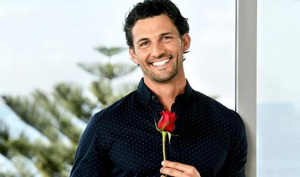tv review: the bachelor
‘Tim Robards ticks all the boxes: good looks, charm, a successful career… and an active lifestyle. What’s missing? The woman of his dreams.’
Reality TV show
The Bachelor tracks Tim as he finds a woman he “can fall in love with” who will eventually become his “life partner”. Luckily for Tim, Channel Ten has done most of the searching for him, electing 25 Australian women from whom he can choose a future wife. Each week, Tim goes on a group date and also elects one woman to accompany him on a single date. The week closes with a “rose ceremony”, where Tim evicts one of “the girls”, as he affectionately calls them. By the end of the season, only one woman will remain for Tim marry and make lots of babies with.
I felt a strange sense of familiarity when watching this show. It reminded me of playing with dolls when I was younger; of games during which my Barbie would be picked from the crowd by Ken, and inevitably end up with a ring on her finger and a baby in her arms.
The plotline of my doll games and that of The Bachelor are near identical, and are also consistent with the majority of romantic films, television shows and songs. All follow a script which has been hammered into us since we were babies dribbling on fairytale books.
Love and sexuality, it says, are epitomised by an attractive, masculine man “choosing” and wooing a woman so they can later stand side by side at the aisle.
Post-structuralists refer to this kind of dominant conception of love as a “grand narrative”. The great variation in the way societies think of and define love and sexuality is heavily influenced by context and social norms we’re exposed to from childhood.
Grand narratives limit how we think about things, and consequently, our actions; due solely to exposure we might subconsciously perceive polygamous relationships as less genuine than monogamous relationships. They shape the way in which we perform sexuality and ultimately, our life course.
The Bachelor exemplifies this phenomenon. The show superficially recreates the development of relationships by adhering to a dominant script, which limits how participants and viewers talk and think about, and eventually perform love.
Firstly, the series presents love as a goal; a box on life’s list which should be ticked by a certain age lest you rot in the bitterness of your wrinkly singledom and probable cat fetish.
In interviews, both Tim and the competitors speak of ‘missing something’ and explain that this something is a significant other in their life, with Tim remarking: ‘I’m now thirty and I’ve got most of the things in my life on the right track… now I just want someone I can spend the rest of my life with.’
At only 33, Katherine describes her “life journey” as “taking a little longer” than normal because she is yet to meet her “prince charming”, while 27-year-old Alison says that she needs ‘to find (her) perfect man!’.
The show’s depiction of love as the end prize, and conflation of this with marriage reflect a dominant discourse which instils in us the importance of getting a person and tying the knot before our mid-thirties.
The show also illustrates that really, you need to be a certain kind of person and in a certain kind of relationship for love to be acceptable.
Before filming even began, Channel Ten rejected any disabled, unemployed, unattractive, above 35 and/or large women from participating. The result is a near white-wash of 25 women from a mid to high socioeconomic background, thin weight-range and heterosexual orientation. The women are reluctant to veer from these ideals, with Rochelle not revealing that she suffers with anxiety until last week, for fear of being rejected.
Not only does the show exclude particular groups of people from love, but also any non-heterosexual, non-monogamous relationships. Overall, the show’s conception of love gives preference to already powerful social groups and signals that only some relationships are acceptable.
Finally, The Bachelor sets gendered roles for us to fulfill in our pursuit of love. It is clearly implied that it is the man, Tim, who actively chooses his partner, while the women are expected to happily accept any attention they can get. Not permitted to leave the mansion unless being ‘taken’ on a date by Tim, the women literally wait for a man, in this case submitting to any man given they entered knowing full well there would only be one option.
Anna challenges this role in her brilliant remark to Tim that while he seemingly ‘chooses’ the women by presenting them with a rose, their accepting it is an equally powerful symbol of their also choosing him. Despite this statement, however, the show’s underlying premise remains that it is a woman’s job to impress a man and to be available to him.
It might be a shit show (loljks it definitely is :-/), but The Bachelor demands attention for what it reveals about the grand narratives which Australian society espouses. The result of mass exposure to this tale is that we use it as a script to follow; we feel we must be and act a certain way to achieve love. Not only does this preference already powerful social groups, but it also limits our ability to conceptualise and perform love in different, more personalised ways.
It may hinder our ability to see love as an ongoing process or output, to shift the onus onto ourselves to exercise care and affection in all relationships, and to understand this as just as satisfying as wearing a ring. With The Bachelor’s final episode to be aired Wednesday this week (don’t get too emotional, now), perhaps it’s time that we question the legitimacy of Australia’s dominant love script.


